
EMPHASIS ON SOCIAL DISTANCING RECEDES IN NH BUT MOST STILL NOT LEAVING HOME TO WORK OR SOCIALIZE
Prepared by:
| University of New Hampshire | Dartmouth College |
| Sean P McKinley, M.A. | Judy Rees, B.M., B.Ch, M.P.H., Ph.D. |
| Tracy E Keirns, Ph.D. | Leila Mott, M.S. |
| Zachary S. Azem, M.A. | Janet Peacock, Ph.D. |
| Andrew E. Smith, Ph.D. |
DURHAM, NH - Granite Staters continue to prioritize social distancing over reopening the economy, but zeal for social distancing has waned over the past two months. Nearly all groups prioritize social distancing less than they did in early May, but Democrats and women continue to place greater emphasis on it than Republicans and men. Granite Staters are leaving their homes more frequently than in April or May, but most did not leave their home even once in the previous seven days to go to work or to socialize with those outside their household. Stress related to work and finances also continues to decline, as young people in particular are feeling considerably less stress about their household finances than in early May.
These findings are based on the Dartmouth College-UNH Survey Center New Hampshire COVID-19 Study*, conducted by the University of New Hampshire Survey Center in collaboration with the Department of Epidemiology at the Geisel School of Medicine at Dartmouth. In the most recent iteration of the survey, seven hundred ninety-one (791) Granite State Panel members who had completed the baseline survey in early April completed a survey online between June 1 and June 4, 2020. Data were weighted by respondent sex, age, education, and region of the state to targets from the most recent American Community Survey (ACS) conducted bu the U.S. Census Bureau, as well as party registration levels provided by the New Hampshire Secretary of State. The Granite State Panel is part of an effort by the University of New Hampshire Survey Center to investigate new ways of gathering and understanding the opinion of New Hampshire residents. Granite State Panel members are recruited from randomly-selected landline and cell phone numbers across New Hampshire and surveys are sent periodically to panel members.
Relative Importance of Restarting the Economy & Maintaining Social Distancing Practices
Respondents were asked whether they think restarting the economy or maintaining social distancing practices is more important when considering how long states should ask or require people to stay home. Just under half (48%) consider maintaining social distancing practices to be more important, a quarter (25%) consider restarting the economy to be more important, and 27% think they are equally important. By contrast, in early May, 56% considered maintaining social distancing to be more important and in early April more than two-thirds (68%) felt this way.
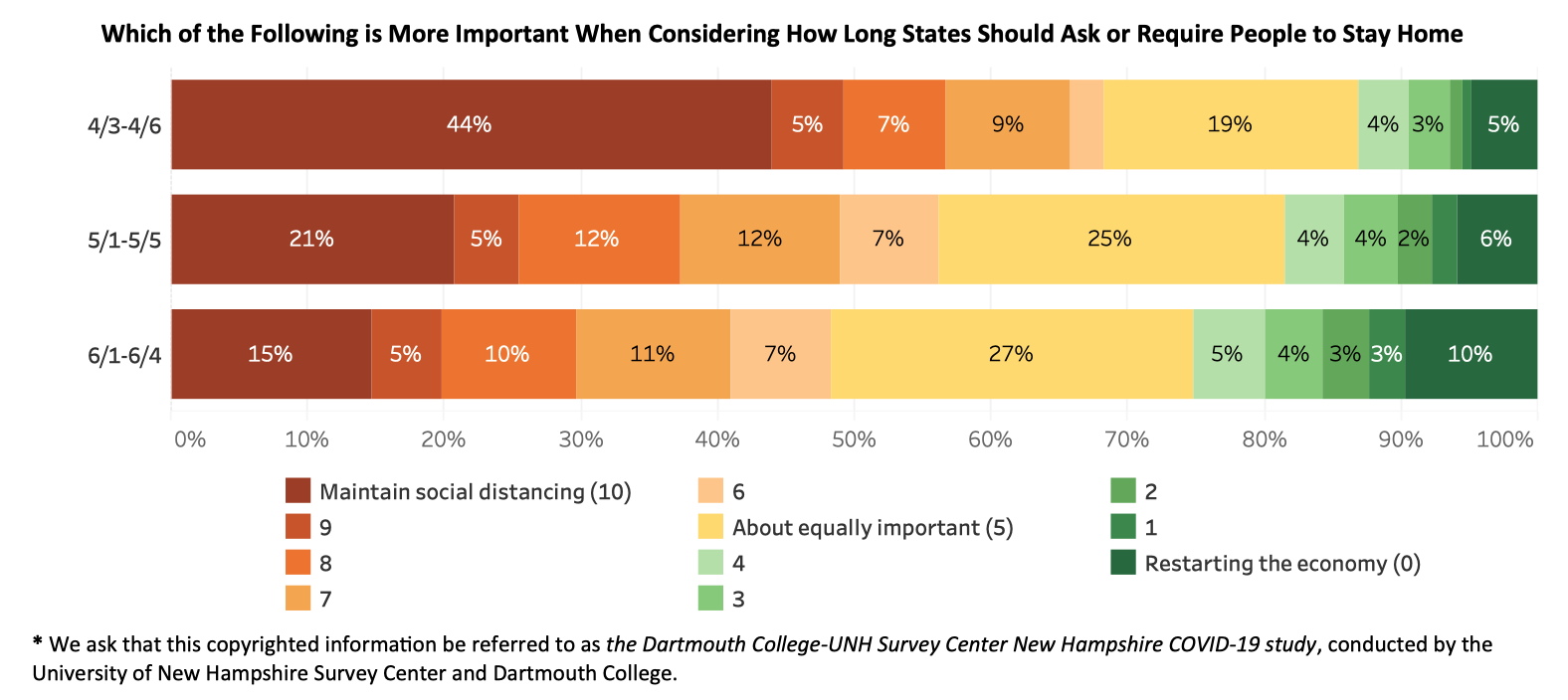
As in earlier months, Granite Staters who have had their hours reduced or lost a job differ only marginally from respondents overall in their opinion of whether maintaining social distancing or restarting the economy is more important. Women (57%) remain a good deal more likely than men (39%) to prioritize social distancing over restarting the economy, while registered Republicans (48%) are six times as likely as Democrats (8%) to prioritize restarting the economy over maintaining social distancing. Respondents aged 30 to 44 are most likely to prioritize restarting the economy, but even among this group only one-third (32%) feel this way.
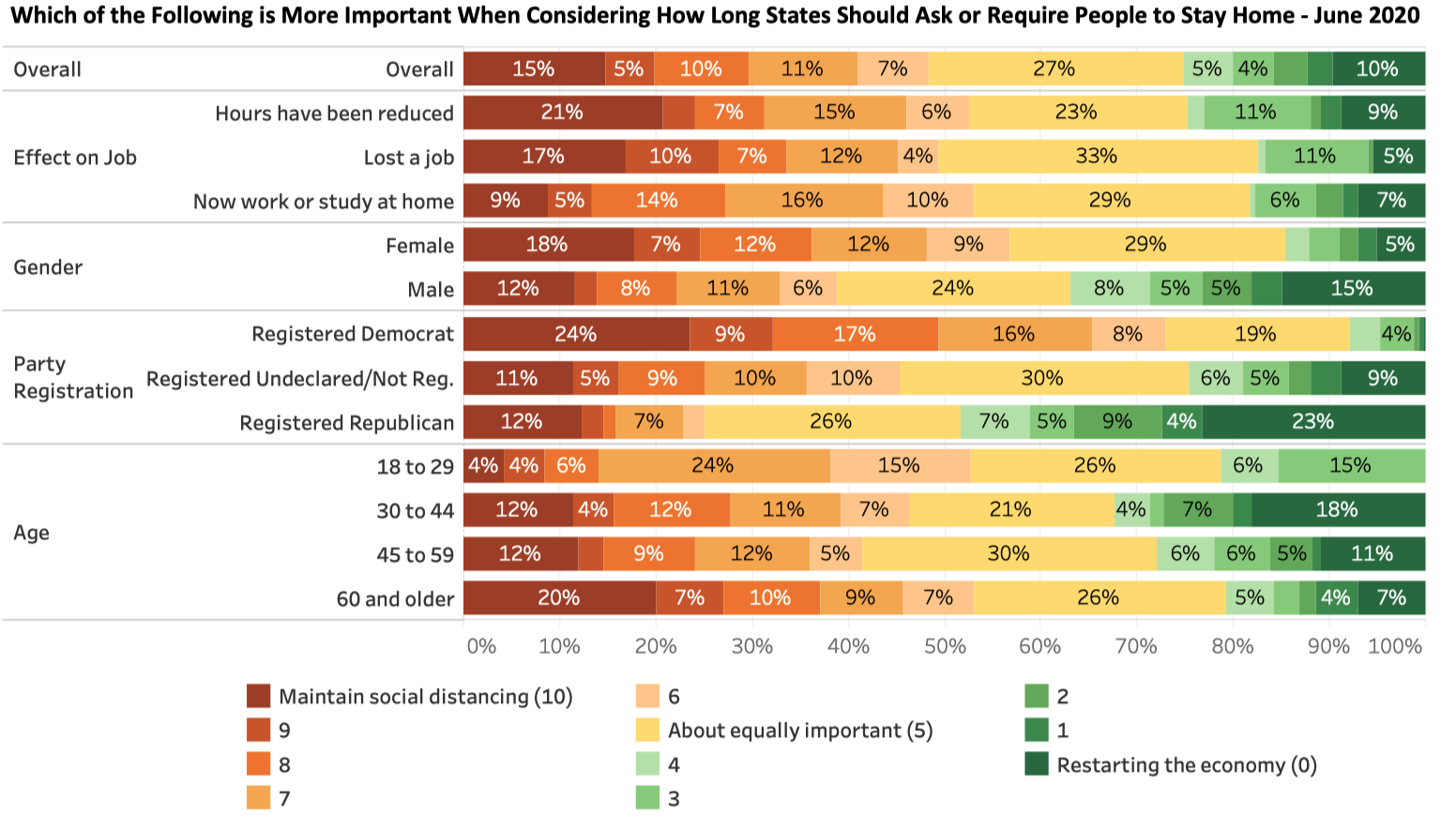
Overall, New Hampshire residents have shifted slightly away from social distancing since early May and opinion has moved in the same direction among each of the following groups.
- The proportion of men who believe social distancing is more important than reopening the economy has declined more rapidly since May than women, resulting in a majority of women (57%) still prioritizing social distancing but only 39% of men feeling this way.
- Registered Democrats, Undeclareds, and Republicans continue to adamantly disagree on this question, but all three groups shifted in their opinion by about the same margin since May.
- Respondents under the age of 30 are far less likely to prioritize social distancing than they were in early May and now prioritize social distancing at about the same rate as respondents of other ages.
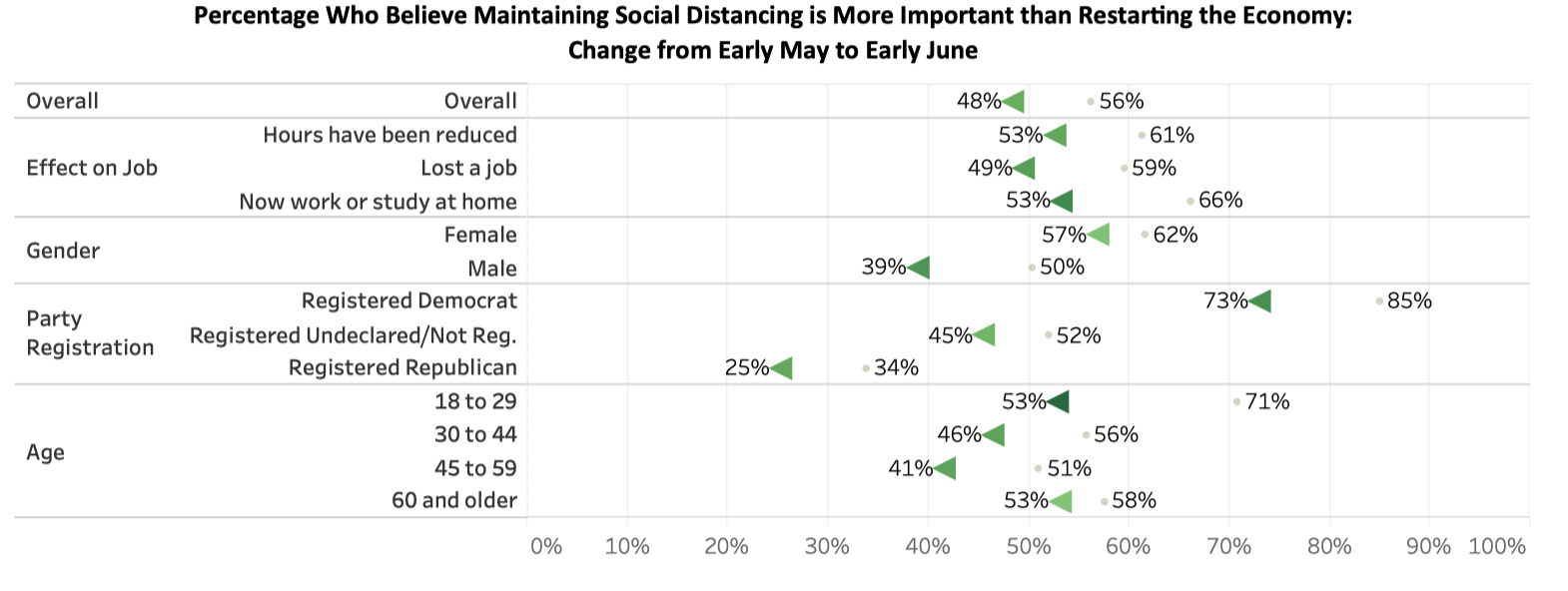
Employment and Finance-Related Stress
Financial and employment-related stress as a result of the COVID-19 pandemic continues to decline among New Hampshire residents. Only three in eight (38%) Granite Staters say they are very (9%) or somewhat (28%) stressed about work, 37% are very or somewhat stressed about the loss or potential loss of their job or reduced hours or income, and 34% are stressed about their family's finances. In April, more than half of respondents indicated that they were very or somewhat stressed about each of these things.
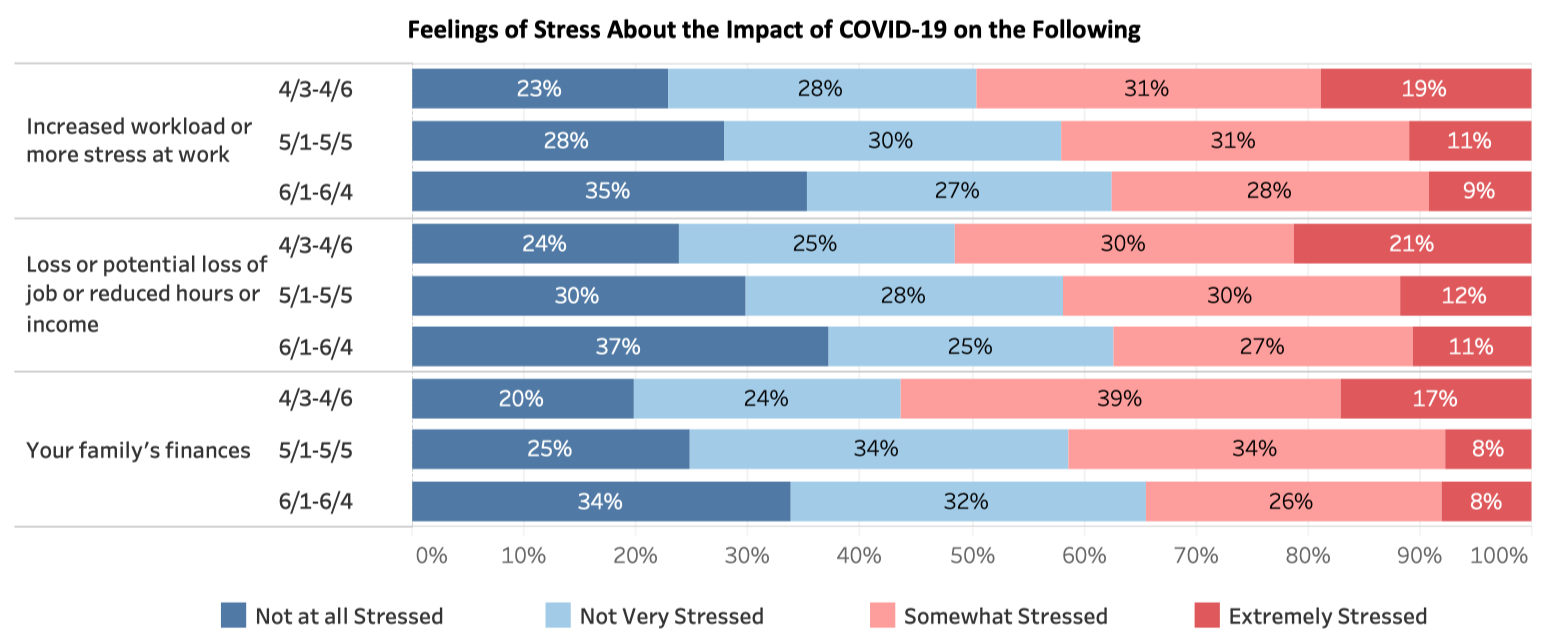
- Stress about family finances has fallen dramatically among respondents under the age of 30 since May and young people are now as concerned about this than all other age groups.
- Women remain more likely than men to be stressed about their family's finances and stressed has declined more sharply among men since May.
- Stress about family finances among respondents who went to technical school or have some college education and those with a college degree has declined more quickly than among others since May and these respondents are now no more stressed about their family's finances.
- Nearly two-thirds of those who have had their hours reduced as a result of the COVID-19 pandemic remain highly stressed about their family's finances, largely unchanged since May, while stress related to family finances has declined among those who have lost a job due to the pandemic.
- Registered Democrats remain more likely than those registered as undeclared and registered Republicans to be stressed about their family's finances. Stress related to this has declined since May among those registered as undeclared and Republicans but has increased very slightly among registered Democrats.
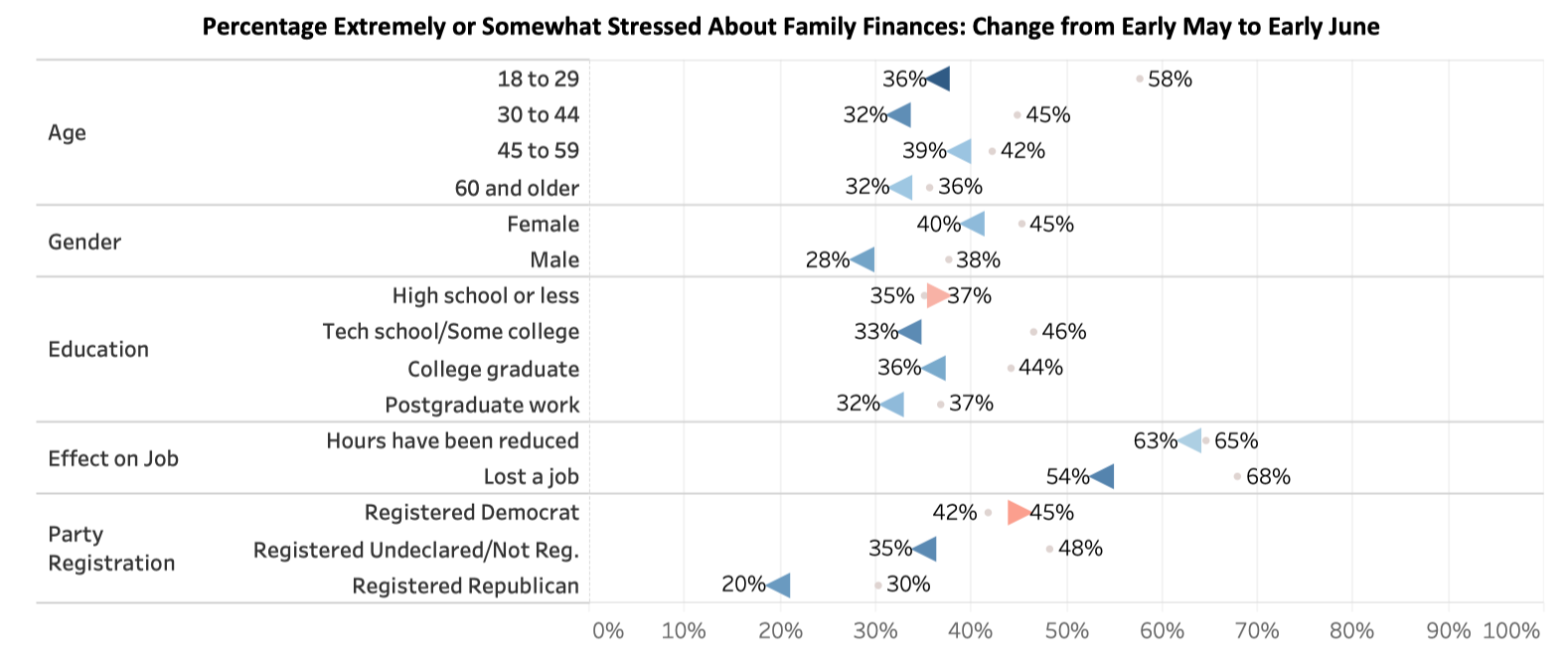
Leaving the Home
As restrictions related to COVID-19 relax in New Hampshire, Granite Staters are venturing out of their homes slightly more often. Only 10% did not leave their home in the previous seven days, 22% left their home 1-2 days, 36% left 3-5 days, and 32% left their home 6-7 days of the previous seven days. By contrast, in early May, 15% had not left their home in the previous seven days and only 24% had left their home sic or seven days of the previous seven.
Two-thirds (67%) of Granite Staters left their home at least once in the past seven days to get groceries or supplies, slightly higher than in early May (60%). Despite an easing of restrictions in New Hampshire, Granite Staters are only slightly more likely to have left home for work (34%) than in early May (31%). One-third (33%) of Granite Staters left their home at least once in the past seven days to socialize indoors with friends or relatives who do not live with them, up from 22% in early May.
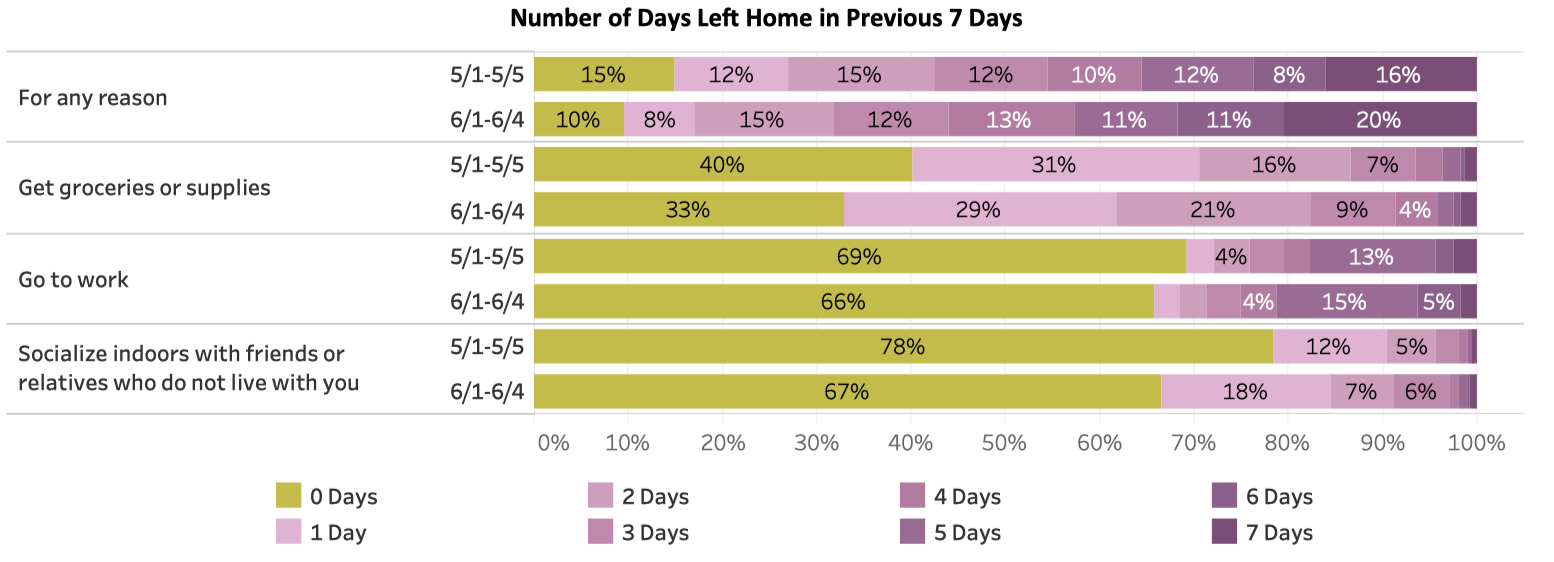
Residents under 30 are more likely than in early May to say they left home at least once in the past seven days in order to go to work, while other respondents are about as likely as in May to have left their home for work. Those who have completed postgraduate work are also slightly more likely than in early May to say they left home at least once in the past seven days to socialize indoors with friends or relatives who do not live with them. Young people and those who went to technical school or have some college education are particularly likely to have done this.
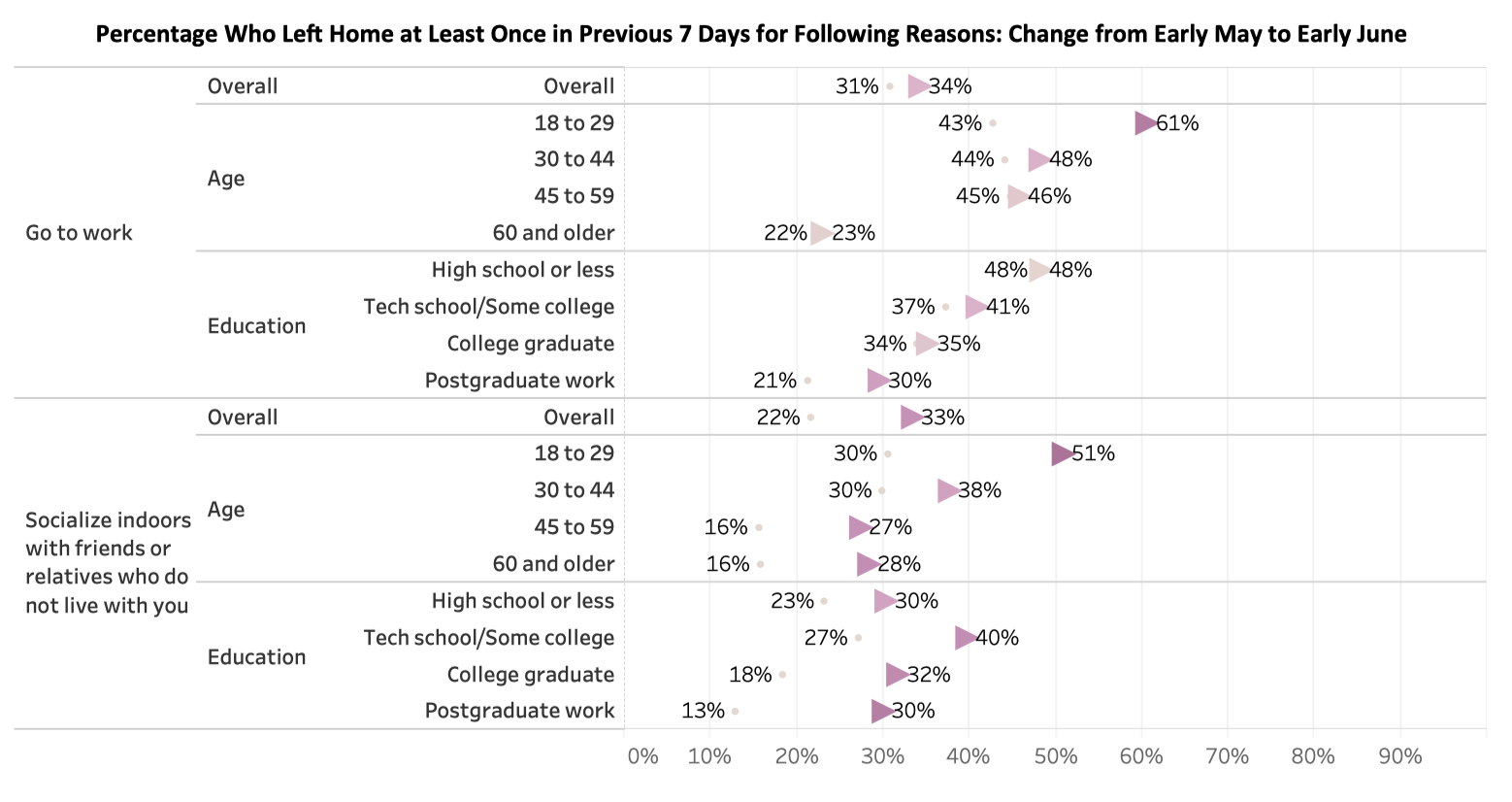
Dartmouth College-UNH Survey Center New Hampshire COVID-19 Study Methodology
These findings are based on the Dartmouth College-UNH Survey Center New Hampshire COVID-19 Study, conducted by the University of New Hampshire Survey Center in collaboration with the Department of Epidemiology at the Geisel School of Medicine at Dartmouth. One thousand and twenty-nine (1,029) Granite State Panel members completed an initial survey online between April 3 and April 5, 2020. Data were weighted by respondent sex, age, education, and region of the state to targets from the most recent American Community Survey (ACS) conducted by the U.S. Census Bureau, as well as party registration levels provided by the New Hampshire Secretary of State. The Granite State Panel is part of an effort by the University of New Hampshire Survey Center to investigate new ways of gathering and understanding the opinion of New Hampshire residents.
Granite State Panel members are recruited from randomly-selected landline and cell phone numbers across New Hampshire. Respondents to the Granite State Poll were asked if they wished to participate in further research and asked to provide an email address. Those who agreed and provided an email address were added to the panel. Panel members were also recruited by texting a random sample of cellular telephones in the state and inviting the recipient to take a short survey.
For each survey which they complete, panel members are entered into quarterly drawings to earn rewards, such as gift certificates from statewide and internet companies. Due to rounding, percentages may not sum to 100%.
For more information about the Dartmouth College-UNH Survey Center New Hampshire COVID-19 study, please visit:
https://cola.unh.edu/unh-survey-center/projects/dartmouthunh-covid-19-survey
For more information about the Granite State Panel, please contact Dr. Andrew Smith at (603) 862-2226 or by email at andrew.smith@unh.edu or visit:
https://cola.unh.edu/unh-survey-center/projects/granite-state-panel
This project is supported by emergency funding from The Hitchcock Foundation, Dartmouth College COVID-19 "Spark" funding, the Jack and Dorothy Byrne Foundation, and in-kind support by UNH Survey Center staff.
Founded in 1797, the Geisel School of Medicine at Dartmouth strives to improve the lives of the communities it serves through excellence in learning, discovery, and healing. The Geisel School of Medicine is renowned for its leadership in medical education, healthcare policy and delivery science, biomedical research, global health, and in creating innovations that improve lives worldwide. As one of America's leading medical schools, Dartmouth's Geisel School of Medicine is committed to training new generations of diverse leaders who will help solve our most vexing challenges in healthcare.
The University of New Hampshire inspires innovation and transforms lives in our state, nation, and world. More than 16,000 students from all 50 states and 71 countries engage with an award-winning faculty in top-ranked programs in business, engineering, law, health and human services, liberal arts and the sciences across more than 200 programs of study. As one of the nation's highest-performing research universities, UNH partners with NASA, NOAA, NSF and NIH, and receives more than $110 million in competitive external funding every year to further explore and define the frontiers of land, sea and space.